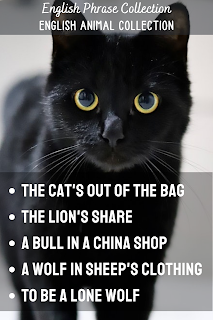Unveiling the Hidden Meanings in English Language
Have you ever heard someone say "the cat's out of the bag" or "a wolf in sheep's clothing" and wondered what they were talking about? Fear not, for we are here to help you decipher these animal related idioms and add some flair to your language!
The Cat's Out of the Bag
This idiom means that a secret has been revealed or something previously unknown has been disclosed. It originates from the practice of fraudsters selling unsuspecting buyers a pig in a bag, only to reveal that the bag contained a cat when the buyer was no longer able to return it.
The Lion's Share
This idiom means the largest or greatest part of something, often undeservedly. It comes from a fable in which a lion and a group of animals hunt together, with the lion taking the biggest share.
A Bull in a China Shop
This idiom describes a clumsy or reckless person who causes damage or chaos. It comes from the image of a bull entering a china shop and knocking over everything in its path.
A Wolf in Sheep's Clothing
This idiom describes a person who pretends to be harmless or friendly but is actually dangerous or deceitful. It originates from Aesop's fable in which a wolf disguises himself as a sheep in order to get close to his prey.
To Be a Lone Wolf
This idiom describes a person who prefers to work or live alone rather than being part of a group. It comes from the behaviour of wolves, who are known to hunt and travel alone.
By understanding and using these idioms, you can add colour and character to your language. Incorporating idioms into your speech and writing can also make you sound more fluent and natural in English.
So let's dive into the fascinating world of animal idioms and unleash your English language skills! And don't forget to check out our YouTube channel English Phrase Collection for more language learning resources.


No comments:
Post a Comment